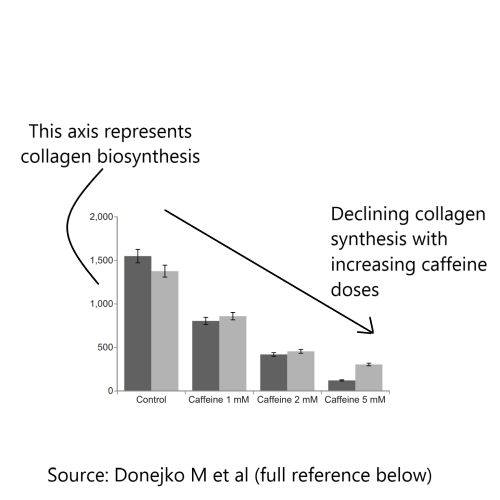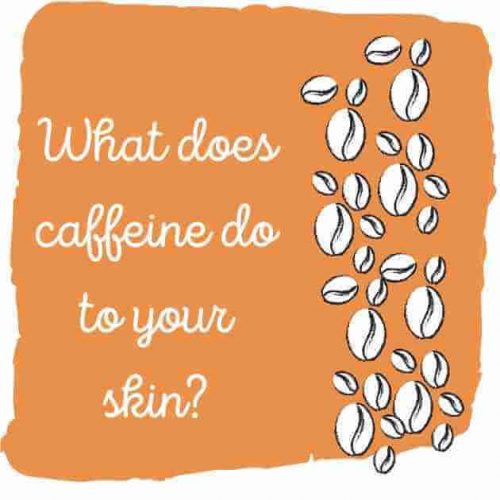Introduction
Recently, the resident Auntyjee in my life (quite the opposite of iconic or chic), dogmatically asserted that my pigmentation and dark skin were due to my excessive caffeine consumption.
This got me thinking in (no particular order):
- I could never date a Trump supporter, xenophobe or a half-hearted racist. Presumably, if one was so inclined, they could use these terms interchangeably and with no objection.
- Colorist Auntyjee needs a one-way ticket to Mars, but then I recalled NASA’s discovery of multiple salt lakes on the red plant. The possibility of life on Mars means theoretically, survival is not impossible. Perhaps Auntyjee can go to Uranus instead.
- What colorist Auntyjee describes as pigmentation is in fact sun-damage. It got me thinking that I don’t know if caffeine is in some shape or form implicated in sun-damage or ageing skin.
Hence, today’s blog (or Mission Caffeine), whose mandate is to find out the impact of excessive caffeine consumption on skin.
I write “excessive consumption” because its unrealistic for me to advocate giving up caffeine. It might have something to do with Starbucks being a US$100bn+ company, and no indicators that there are long-term declines in caffeine consumption.
Let’s talk about caffeine
There is a sickening amount of research undertaken on caffeine: close to forty thousand journal articles and over a thousand books have been published on this.
Global consumption of caffeine is ridiculous. Latosińska estimates it at one cup of coffee per day for every human on the planet. Caffeine consumption is high in the USA, Brazil, Germany, France and Italy. Most caffeine consumption is via coffee (79%), about 15% from tea and the rest makes up cocoa.
Benefits of caffeine
- Caffeine increases memory
- Improves reaction time and logical reasoning, helps in periods of sleep restriction related to job and reduces drivers or pilots errors
- Reduces risk of suicide and depression
- Increases stamina during exercise
And there are a hideously more benefits that if I were to write them, I’d have to start a new website.
Downsides of caffeine
Latosińska writes that these include:
- Incontinence
- Indigestion
- Forceful heart contractions, allergies, risk of bone fractures
- Impairment of hearing loss recovery
- Inhibition of the collagen production in the skin
- Even obesity and diabetes are also on the list of potential negative effects. Recently, a large population study in the United States showed that an increase in caffeine consummation results in decrease in telomere* length, which signifies accelerated ageing.
*Telemore length is a molecular index of biologic aging, so not really relevant to us.
The importance of collagen
If you are a regular reader of my blog, you’ll know from my short series on hyaluronic acid, that collagen is present in the dermis (the second layer of the skin). Collagen is a protein that is abundantly found in our skin. (About 70% of the dry weight of skin is collagen)
Collagen provides skin with durability and resilience.
There are many types of collagen, but in the dermis of a young person, Type I comprises 80%-85%, Type III comprises 10-15% and Type V about 5%.
Type I collagen is responsible for the tensile strength of the dermis. Type III collagen is smaller than Type I collage and forms bundles, allowing for skin pliability.
Collagen is linked to aged skin – its lower in photodamaged skin. Importantly, the ratio of Type 1: Type III collagen starts to decline with age. Therefore, there is less of the collagen type that gives skin durability and resilience in aged skin. This is not rocket science because aged skin clearly is less “firm”, “tight” or “saggy.”
Inhibition of collagen synthesis
Donejko et al write that, “Caffeine (methyltheobromine) is an alkaloid and a widespread ingredient of several pharmacy drugs. Caffeine is also present in soft drinks, energy drinks, and coffee infusions.”
They add that one of the adverse effects of caffeine us is the inhibition of wound healing process and that collage biosynthesis is essential to wound healing.
Their test is a lab experiment performed on exposing human skin fibroblasts (responsible for collagen production) to caffeine The authors write that the enzyme prolidase is essential to collagen synthesis. What they demonstrate is that with increasing doses of caffeine the activity of prolidase enzyme declines or is inhibited, which means declining collagen synthesis.
For good measure, they throw in hyaluronic acid. But results indicate that hyaluronic acid has no impact on the decline in prolidase activity.
This is the key graph that you need to take away.

Final remarks
I am going to be cutting back on my coffee consumption. It’s a no brainer for me. However, if you are not a coffee drinker, than here are the caffeine doses in other drinks:
| Caffeine drink | Size in oz (ml) | Caffeine (mg) | |
| Coffee | Brewed | 8(237) | 95-165 |
| Brewed, decaffeinated | 8(237) | 2-5 | |
| Espresso | 1(30) | 47-64 | |
| Espresso, decaffeinated | 1(30) | 0 | |
| Instant | 8(237) | 63 | |
| Instant, decaffeinated | 8(237) | 2 | |
| Latte or mocha | 8(237) | 63-126 | |
| Tea | Brewed black | 8(237) | 25-48 |
| Brewed black, decaffeinated | 8(237) | 2-5 | |
| Brewed green | 8(237) | 25-29 | |
| Instant | 8(237) | 40 | |
| Green tea | 8(237) | 25 | |
| Fizzy drink | Coca Cola | 8(237) | 24-46 |
| Energy drink | Energy drink | 8(237) | 27-164 |
| Energy shot | 1(30) | 40-100 |
Sources and uses
Donejko M et al Influence of caffeine and hyaluronic acid on collagen biosynthesis in human skin fibroblasts, Drug Design, Development and Therapy 2014:8 1923-1928
Latosińska et al Chapter 1, Introductory Chapter: Caffeine, a Major Component of Nectar of the Gods and Favourite Beverage of Kings, Popes, Artists and Revolutionists, a Drug or a Poison? Published by Intech Open Science, Open Minds
Borota D, Murray E, Keceli G, Chang A, Watabe JM, Ly M, et al. Post-study caffeine administration enhances memory consolidation in humans. Nature Neuroscience. 2014;17(2):201-203. DOI: 10.1038/nn.3623
Horne JA, Reyner LA. Counteracting driver sleepiness: effects of napping, caffeine, and placebo. Psychophysiology. 1996;33(3):306-309.
Lucas M, O’Reilly EJ, Pan A, Mirzaei F, Willett WC, Okereke OI, Ascherio A. Coffee, caffeine, and risk of completed suicide: Results from three prospective cohorts of American adults. The World Journal of Biological Psychiatry. 2014;15(5):377-386.
Lucas M, Mirzaei F, Pan A, et al. Coffee, caffeine, and risk of depression among women. Archives of Internal Medicine. 2011;171(17):1571-1578.
Tauler P, Martínez S, Moreno C, Monjo M, Martínez P, Aguiló A. Effects of caffeine on the inflammatory response induced by a 15-km run competition. Medicine and Science in Sports and Exercise. 2013;45(7):1269-1276.
Gleason JL, Richter HE, Redden DT, Goode PS, Burgio KL, Markland AD. Caffeine and urinary incontinence in US women. International Urogynecology Journal. 2013;24(2):295-302
Shirlow MJ, Mathers CD. A study of caffeine consumption and symptoms; indigestion, palpitations, tremor, headache and insomnia. International Journal of Epidemiology. 1985;14(2):239-248.
Tomaszewski M, Olchowik G, Tomaszewska M, Dworzanski W, Burdan F. The influence of caffeine administered at 10 degrees C on bone tissue development.
The Annals of Agricultural and Environmental Medicine.2016;23(2):319-323
Zawawi F, Bezdjian A, Mujica-Mota M, Rappaport J, Daniel SJ. Association of caffeine and hearing recovery after acoustic overstimulation events in a guinea pig model. Otolaryngology–Head & Neck Surgery. 2016;142(4):383-388.
Donejko M, Przylipiak A, Rysiak E, Głuszuk K, Surażyński A. Influence of caffeine and hyaluronic acid on collagen biosynthesis in human skin fibroblasts. Drug Design, Development and Therapy. 2014;8:1923-1928
Malik VS, Popkin BM, Bray GA, Després J-P, Willett WC, Hu FB. Sugar-sweetened beverages and risk of metabolic syndrome and type 2 diabetes: A meta-analysis. Diabetes Care. 2010;33(11):2477-2483
